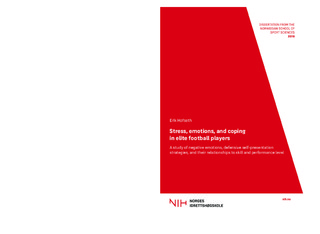| dc.contributor.author | Hofseth, Erik | |
| dc.date.accessioned | 2016-09-02T08:21:04Z | |
| dc.date.available | 2016-09-02T08:21:04Z | |
| dc.date.issued | 2016 | |
| dc.identifier.isbn | 978-82-502-0529-1 | |
| dc.identifier.uri | http://hdl.handle.net/11250/2403748 | |
| dc.description | Avhandling (doktorgrad) - Norges idrettshøgskole, 2016 | nb_NO |
| dc.description.abstract | This thesis investigated potential relationships between stress emotions, the use of defensive self-presentation strategies as coping strategies, accuracy of self-perceptions, and skill and performance level in elite soccer players. These potential relationships were examined using the Cognitive-Motivational-Relational Theory of Emotion (Lazarus, 1991) as the overarching theoretical framework. Specifically, the emotions of anxiety, shame, and guilt were assessed as well as the self-presentation strategies of self-handicapping and sandbagging. The thesis includes three quantitative studies (Paper 1-3) and one qualitative study (Paper 4). Results suggest that elite youth football players use sandbagging to cope with sport competitive anxiety (Paper 1). Although the prevalence of sandbagging was relatively low, there seems to be a relationship with age: the older the players, the fewer of them who use sandbagging. Sport competition anxiety was found to be negatively related to players’ skill level and future performance level, while sandbagging and self-handicapping were unrelated to skill and performance level (Paper 3). Shame and guilt were found to be indirectly related to elite youth players’ skill level through the use of self-handicapping; shame negatively and guilt positively (Paper 2). In a qualitative interview study, professional football players stated that they were fearful of performance failures, and indicated that they were likely to experience shame but not guilt in response to performance failures (Paper 4). They also indicated that one by experience learns how to deal with shame related to performance failures. The results further showed that most of the youth elite players had inaccurate self-perceptions, in that they tended to overestimate their skill level in comparison to their coaches’ evaluations. This tendency was negatively related to players’ future performance level. Possible explanations for this finding may be found in various cognitive biases (Paper 3). In conclusion, this dissertation suggests that that elite football players use both sandbagging and self-handicapping to deal with emotions such as anxiety and shame although the prevalence of both strategies is relatively low. Anxiety and shame were found to be negatively related to skill and/or performance level, while guilt may have a positive effect (through a negative effect on self-handicapping). In addition, the accuracy of self-perceptions relative to the coach's perceptions of players' skill seems to be related to youth players' future performance level. It was also found that players learn by experience how to properly deal with stress emotions. This implies that coaches should be aware of the behaviors related to maladaptive coping strategies in order to correct players and help them live up to their potential. | nb_NO |
| dc.description.abstract | Paper I: Hofseth, E., Toering, T., & Jordet, G. (Submitted). Sandbagging as a media coping strategy in elite youth soccer players: The influence of age and trait sport competition anxiety.
Denne artikkelen ble tatt ut av den elektroniske versjonen av doktoravhandlingen i Brage på grunn av copyright-restriksjoner / This paper was removed from the electronic version of this PhD-thesis in Brage due to copyright restrictions. | |
| dc.description.abstract | Paper II: Hofseth, E., Toering., T., & Jordet, G. 2015). Shame proneness, guilt proneness, behavioral selfhandicapping, and skill level: A mediational analysis. Journal of Applied Sport Psychology, 27, 359-370. | |
| dc.description.abstract | Paper III: Hofseth, E., Toering., T., Jordet, G., & Ivarsson, A. (In review). Perception of skills and performance level in youth elite soccer: Are positive self-perceptions always positive? | |
| dc.description.abstract | Paper IV: Hofseth, E., Pedersen, J. V., Toering., T., & Jordet, G. (Submitted) Shame-coping in professional soccer players: An exploratory interview analysis. | |
| dc.language.iso | eng | nb_NO |
| dc.subject | nih | |
| dc.subject | doktoravhandlinger | |
| dc.subject | fotball | |
| dc.subject | stress | |
| dc.subject | angst | |
| dc.subject | skam | |
| dc.subject | strategier | |
| dc.title | Stress, emotions, and coping in elite football players: a study of negative emotions, defensive self-presentation strategies, and their relationships to skill and performance level | nb_NO |
| dc.type | Doctoral thesis | nb_NO |
| dc.subject.nsi | VDP::Social science: 200::Psychology: 260::Other psychology disciplines: 279 | nb_NO |
| dc.subject.nsi | VDP::Social science: 200::Social science in sports: 330::Other subjects within physical education: 339 | nb_NO |
| dc.description.localcode | Seksjon for coaching og psykologi / Department of Coaching and Psychology | nb_NO |
